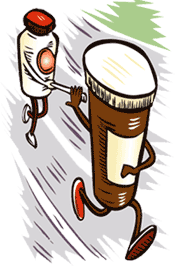 There is a definite connection between chronic pain and spirituality. This is not to fall prey to the oversimplification that says that our adversity is a result of our disobedience to God's will. Jesus clearly repudiates this view, popular in his time, which made suffering the direct result of our sinfulness (Luke 13:1-5 and John 9).
There is a definite connection between chronic pain and spirituality. This is not to fall prey to the oversimplification that says that our adversity is a result of our disobedience to God's will. Jesus clearly repudiates this view, popular in his time, which made suffering the direct result of our sinfulness (Luke 13:1-5 and John 9).
The connection between pain and spirituality is found in the way we relate our spiritual nature to our physical nature. When we look at our pain and suffering through "the eyes" of our spirit, we see that the important thing is not the pain itself, but rather the way we deal with it. The English poet John Milton (1608-1674) once wrote, "It is not miserable to be blind. It is miserable to be incapable of enduring blindness."
A very close friend of mine, who is also a retired priest, fell from a ladder while cleaning his gutters and broke both his legs. That was a number of years ago and he still experiences a great deal of pain.  He observes that "through prayer and meditation we are empowered to bear up under more adversity than we could under normal circumstances and we can rise above the increased level of pain." Perhaps the supreme example of how we should deal with pain is found in Christ's own suffering on the cross. "Although he was a son, he learned obedience through what he suffered" (Hebrews 5:8).
He observes that "through prayer and meditation we are empowered to bear up under more adversity than we could under normal circumstances and we can rise above the increased level of pain." Perhaps the supreme example of how we should deal with pain is found in Christ's own suffering on the cross. "Although he was a son, he learned obedience through what he suffered" (Hebrews 5:8).
"Let us rejoice in our sufferings," writes St. Paul, "knowing that suffering produces patience, and patience produces character, and character produces hope" (Romans 5:3,4). Paul also welcomes his "thorn in the flesh" as the way to know what strength is to be found in an awareness of our personal weakness (II Corinthians 12:7-9). "For the sake of Christ, then, I am content with weaknesses, insults, hardships, persecution, and calamaties; for when I am weak, then I am strong" (II Corinthians 12:10).
One of the greatest paradoxes of the Christian Life is found in the joy that accompanies our tribulation and pain. "Praise God from whom all blessings flow."
These thoughts from the Rev. Canon Ronald G. Albury were originally published in
Health News from the Episcopal Church Medical Trust.
Our once-monthly healing service is tonight at 6 p.m.
There is a definite connection between chronic pain and spirituality. This is not to fall prey to the oversimplification that says that our adversity is a result of our disobedience to God's will. Jesus clearly repudiates this view, popular in his time, which made suffering the direct result of our sinfulness (Luke 13:1-5 and John 9).
He observes that "through prayer and meditation we are empowered to bear up under more adversity than we could under normal circumstances and we can rise above the increased level of pain." Perhaps the supreme example of how we should deal with pain is found in Christ's own suffering on the cross. "Although he was a son, he learned obedience through what he suffered" (Hebrews 5:8).







0 Comments:
Post a Comment
<< Home